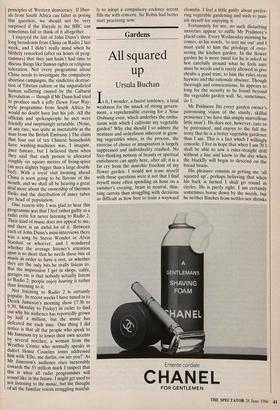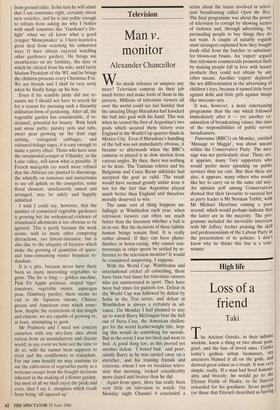Gardens
All squared up
Ursula Buchan
Is it, I wonder, a fascist tendency, a fatal weakness for the smack of strong govern- ment, a reprehensible craving for a Neue Ordnung even, which underlies the enthu- siasm with which I cultivate my vegetable garden? Why else should I so admire the neatness and orderliness inherent in grow- ing vegetables when, in the process, the exercise of choice or imagination is largely suppressed and individuality crushed. No free-thinking notions of beauty or spiritual enrichment can apply here, after all; it is a far cry from the anarchic freedom of my flower garden. I would not tease myself with these questions were it not that I find myself more often spending an hour on a summer's evening, brain in neutral, thin- ning carrots than struggling with decisions as difficult as how best to train a wayward clematis. I feel a little guilty about prefer- ring vegetable gardening and wish to pun- ish myself for enjoying it.
Fortunately for me, no such disturbing anxieties appear to ruffle Mr Pridmore's placid calm. Every Wednesday morning he comes, in his words, `to sort me out' and I must yield to him the privilege of over- seeing the kitchen garden. In the flower garden he is more timid for he is asked to hoe carefully around what he feels sure must be weeds and is rarely allowed to give shrubs a good trim; to him the rules seem haywire and the rationale obscure. Though thorough and conscientious, he appears to long for the security to be found beyond the vegetable garden wall. So, sometimes, do I.
Mr Pridmore fits every garden owner's patronising vision of the sturdy, skilful pensioner ('we have this simply marvellous little man'). He does not, however, care to be patronised, and enjoys to the full the irony that he is a better vegetable gardener than I am. This is a fact which I willingly concede. I live in hope that when I am 70 I shall be able to sow a ruler-straight drill without a line and know to the day when the blackfly will begin to descend on the broad beans.
His pleasure consists in getting me 'all squared up', perhaps believing that when his back is turned I shall go round in circles. He is partly right. I am certainly sometimes borne down by the weeds, but he neither flinches from nettles nor shrinks from ground elder. In his turn he will admit that I am sometimes right, certainly about new varieties, and he is just polite enough to refrain from asking me why I bother with small tomatoes like 'Gardener's De- light' when we all know what a good cropper 'Moneymaker' is. I have learned a great deal from watching his unhurried ways (I have always enjoyed watching other gardeners garden). He brings me strawberries on my birthday, the date of which he elicited from his wife, until lately Madam President of the WI, and he brings the children presents every Christmas Eve. We are friends and I shall be very sorry when he finally hangs up his hoe.
Even if his sensible pride did not re- assure me I should not have to search far for a reason for pursuing such a blatantly utilitarian form of gardening. After all, the vegetable garden has considerable, if re- strained, potential for beauty. With brick and stone paths, parsley pots and tubs, sweet peas growing up the fruit cage netting, variegated cabbages, and coloured-foliage sages, it is easy enough to make a pretty effect. Those who have seen the ornamental potager at Villandry, in the Loire valley, will know what is possible. If French marigolds (so much more refined that the African) are planted to discourage the whitefly on tomatoes and nasturtiums to see off aphids on the courgettes, some floral element, satisfactorily tamed and arranged, may be safely and happily admitted.
I wish I could say, however, that the number of committed vegetable gardeners is growing but the widespread evidence of abandoned allotments is too obvious to be ignored. This is partly because the work seems, with so many other competing distractions, too labour-intensive, but is also due to the ubiquity of freezers which make the growing of quantities of space- and time-consuming winter brassicas re- dundant.
It is a pity, because never have there been so many interesting vegetables to grow. The list is long — golden zucchini, Pink Fir Apple potatoes, striped 'tiger' tomatoes, vegetable oyster, asparagus peas, Hamburg parsley; there seems no end to the Japanese onions, Chinese greens and American corn which some- how, despite the restrictions of day-length and climate, we are capable of growing or, at least, attempting to grow.
Mr Pridmore and I need not concern ourselves with any airy-fairy idea about retreat from an unsatisfactory and chaotic world; in any event we have not the time to do so, with the runner bean supports to erect and the cauliflowers to transplant. For our own benefit we may continue to use the cultivation of vegetables partly as a welcome escape from the fraught decisions inherent in the making of a flower garden, but most of all we shall enjoy the pride and even, dare I say it, smugness which result from being 'all squared up'.



















































 Previous page
Previous page